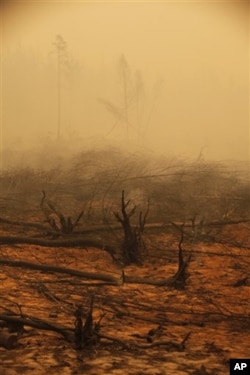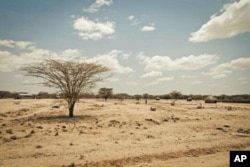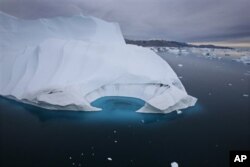This is Part 1 of a 5-part series: Climate Change
Continue to Parts: 1 / 2 / 3 / 4 / 5
Ahead of a global summit on climate change set to begin in South Africa on November 28, scientists and activists are warning that the stakes at the conference could not be higher for the entire African continent.
“Projections are that Africa will be hit first by climate change, and it will be hit hardest,” said Kevin Chika Urama, a Kenyan ecological economist who’s analyzing the effects of changing weather patterns on Africa.
There’s compelling evidence to suggest, though, that Africa has been suffering the negative consequences of climate change for quite some time. Urama himself has co-authored a paper showing that disasters – from cyclones to droughts to floods to resulting famines – have shown marked increases in number and severity across the continent in recent decades.
Taken as a whole, these events correspond with rising temperatures in Africa and around the world that scientists say are caused by the emission of greenhouse gases, such as carbon dioxide, from industrial activity – mainly the burning of coal for energy.
African ‘Armageddon’
According to the United Nations Environment Program, Africa produces only four percent of the world’s total carbon discharges, because the continent is still largely undeveloped in terms of big industry. Yet Africa will be most affected by climate change and is “staring at an Armageddon,” said Urama.
“The technologies that we have in order to be able to buffer the effects of climate change are weaker in Africa. Human capacities in order to be able to adapt are also weaker in Africa and so are our disaster response systems,” he explained. “While advanced countries have a large measure of technological insulation against climate change, Africa does not.”
Lack of investment in science, said Urama, means that the region is mostly unable to accurately forecast “radical weather events” associated with climate change. This, he insisted, is already costing many lives and could lead to many preventable deaths in the near future.
Taryn Pereira of South Africa’s Environmental Monitoring Group has collected testimony from many Africans about changing weather patterns that are destroying their lives.
“I remember a Malawian rural woman who talked about the endless cycle of floods and droughts where she lives and how she’s struggling to survive,” the environmental researcher recalled. “There were people in tears talking about just not being able to make enough food to feed their families. Now that’s not a new story in Africa, but climate change really exacerbates those kinds of problems.”
Climate change has the potential to devastate agriculture in Africa, according to Ephraim Nkonya, a senior research fellow at the International Food Policy Research Institute in Washington, DC. He said, “I don’t think I need to explain what this would mean for the 70 percent of the population that depends on this sector for their livelihoods. It’s certainly a terrible scenario.”
The UN has estimated that more than 180 million people in sub-Saharan Africa alone could die as a result of climate change by the end of the century.
Hot world; hotter Africa
Lester Brown, an environmental scientist and chief of the United States’ Earth Policy Institute, said the world’s becoming a much hotter place. The pioneer environmentalist, who began warning of the dangers of climate change in the 1970s, said skeptics who don’t believe this are “just plain wrong.”
Brown said records show that heat waves are happening more often and are more intense. The former advisor to several U.S. presidents pointed to heat waves that struck Europe and killed an estimated 40,000 people in 2003.
In Russia last year the average July temperatures for Moscow rocketed to eight degrees C (46 degrees F) above the norm.
“Moscow had temperatures of over 100 degrees F (almost 38 degrees C) some days, which it had never experienced before,” said Brown. He added, “The state of Texas recently completed the hottest 12 months…and the driest 12 months in its history.”
But it’s in Africa, say scientists, where temperatures are expected to increase the most in the future.
“If you look at the warming thus far, large parts of Africa…have warmed more than (other) regions,” said a leading authority on climate change, Professor Paul Mayewski. He’s director of the Climate Change Institute at the University of Maine in the United States.
“This may have to do with expanding desert regions in Africa related to both [artificial, global] warming and changes in atmospheric circulation triggered naturally and by warming,” explained the internationally respected climatologist.
One of the world’s most influential scientists, Gordon Conway of Britain, agrees that Africa is warming faster than other regions and is already enduring hotter weather with fewer cooler periods.
The Intergovernmental Panel on Climate Change, a group of international scientists mandated by the UN, has predicted that temperatures in northern and southern Africa are likely to rise by up to 4 degrees C (7.2 degrees F) over the next 100 years, and will become “much drier.”
Mayewski said the higher temperatures are changing precipitation patterns. According to Urama, this change could soon result in much less rain across large swathes of Africa and much more rain in other areas, such as Central Africa.
‘Little Ice Age’ ends
Mayewski is a renowned explorer who’s a veteran of 50 scientific research expeditions to the Arctic, Antarctica, the Tibetan Plateau and glacial regions in South America. He’s witnessed the effects of climate change first hand and has “no doubt” that humans are responsible for the phenomenon.
Mayewski is convinced that the earth should presently still be in a naturally cooler stage that began about a thousand years ago and is known as the “Little Ice Age.” But he said industrialization and its pollution of the atmosphere, which began intensively in the late 1800s in Western Europe and the United States, have ended this period and have imposed unnatural warming on the planet.
The evidence of this, said Mayewski, is clear: “As greenhouse gas emissions begin to increase in the late 1800s, so glaciers around the world begin to melt.”
The climatologist continued, “Then as you get into the last century, and particularly as of the 1970s and 1980s, you begin to see greenhouse gas induced temperatures rising dramatically and overpowering what might have been a continuing cool period.”
Civilizations destroyed
Mayewski’s findings around a phenomenon he refers to as “abrupt climate change” have helped to raise global awareness about the importance of severely limiting greenhouse gas emissions to stop global warming.
In the late 1980s, a team of scientists, including Mayewski, was analyzing past and present ice melts in Greenland. It confirmed something that had previously only been hinted at.
“What we discovered was the fact that the climate system could change very dramatically in a very short period of time…. That change could occur in less than a decade and in some cases, in less than one to two years,” Mayewski explained. “And once that change occurred – in temperature, and also in precipitation and also in storminess – it was sustained for many decades if not hundreds to thousands of years….”
He held that such abrupt climate changes have in the past been responsible for wiping out entire civilizations and cultures that were unable to adapt to them. Mayewski cited the Mayans of Central America and the Mesopotamians of the Middle East, who were rapidly afflicted by drought 900 years ago and about 4,000 years ago respectively.
“These two drought events occurred because of a shift in atmospheric circulation patterns. That basically meant that there were more months of the year that there was drought. Because in both cases civilizations had evolved, and people were no longer hunter gatherers and couldn’t move to places with sufficient water, the change in climate destroyed them.”
South African environmentalist Taryn Pereira said unlike peoples of the past, modern humans have the ability to adapt to climate change and the technology to slow it. But what’s missing at this stage, she said, is the political courage required to implement international legislation to stop all harmful emissions that are warming the earth.
Ice melts
Mayewski described abrupt climate change as a very important finding because prior to it, climate experts believed it took hundreds of thousands of years for weather patterns to change. He commented, “If that belief still held, one perhaps might not be as excited as one is now about (the harmful effects of) increased greenhouse gases….” And people wouldn’t be paying much attention to the emissions’ potential to disturb the earth’s natural climate system to such a degree that the planet suffers catastrophic consequences.
“We’re pushing the system to the point at which it won’t just gradually warm but it might actually warm in a series of very, very abrupt steps,” said Mayewski.
He added that the Arctic is already providing an example of abrupt climate change. He explained that up until recently scientists had estimated that higher temperatures would result in an ice-free Arctic ocean in the summer for the first time in 2040 to 2050. “Then, within a very short period of time, the estimates went to 2025. Now we know it’s possible that this will happen within the next few years.”
Besides the negative impact warmer weather is having on Arctic wildlife, said the scientist, the ice melts are also adversely affecting the entire planet. “It’s allowing tremendous amounts of heat to escape from the Arctic Ocean, which was normally capped off by sea ice, (and) the release of even more gases.”
Rising sea level
Lester Brown’s Earth Policy Institute is closely monitoring Greenland’s ice sheet. “It’s also melting,” he said. “If it were to melt entirely, it would raise the sea level (by) seven meters. You can make a long list of cities that would be either partly or even totally under water with that sort of sea level rise.”
Scientists say a much lower sea level increase would swamp many of Africa’s coastal regions and island nations. Ecological economist Kevin Urama pointed out that a rising ocean level is already flooding lowland in some coastal areas of Africa – in Lagos, Nigeria, for example.
Mayewski’s “conservative” forecast is for a sea level rise of at least a meter and a half by 2100 – mainly because of ice melts in the Arctic, Antarctica and Greenland. But taking into account his studies of events in the distant past, he said the sea level increase could be much higher in the near future.
“Many models agree that we should expect (an average global temperature increase) of three degrees C by 2100,” Mayewski said. “Now if you look at increases in three degrees in temperature going back in the geological record, (when that happened) sea level was raised much higher than two meters; it was several meters higher.”
He’s convinced, however, that sea level increase “won’t come in a linear fashion. We could very well get a big chunk of ice coming off Antarctica and raising sea level by a couple of centimeters in a relatively short period of time. That doesn’t sound like very much but if it happens very quickly, it could be significant.”
Mayewski said a sea level increase of just 20 centimeters would have “severe social, political and environmental ramifications” for millions of people that would reverberate around the world.
“It increases coastal erosion. It can contaminate freshwater sources that are close to the ocean. It kills habitats; it changes navigation; it changes municipal and political boundaries. It creates climate refugees who can no longer live in those areas.”
‘The future is now’
At this stage, said Mayewski, the world’s future looks set to be filled with abrupt warming that will likely happen in different places and at different times and will result in “life-changing events” for the people affected.
Brown insisted such events are already happening. In the past, he said, severe weather occurrences such as tropical storms had been confined to the American south. “Now we’ve got hurricanes hitting New York City,” he said.
Brown also highlighted the fact that the U.S. had recently experienced “one of the worst tornado season’s in history. States like Massachusetts had tornadoes that had never had them before. Whole towns were destroyed. It was as though they’d been in war and been bombed to pieces.”
He added, “If extreme weather events can cause so much damage to an extremely developed country like the United States, imagine what they’ll do to places in Africa.”
Appealing to world leaders to make “immediate visionary decisions” to combat future climate change at the upcoming summit, Pereira commented, “If they don’t realize that in many respects, the earth’s future is already here, then we should all start preparing for the worst.…”








